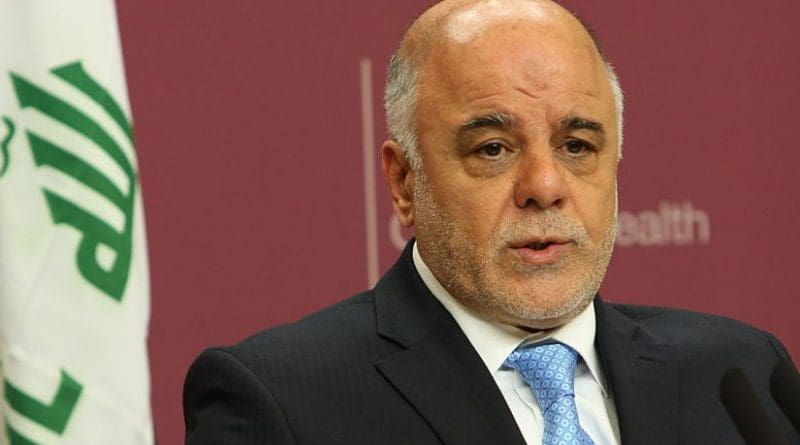Iraq’s Elections Portend Grave Uncertainties – OpEd
By Arab News
By Talmiz Ahmad*
Two developments with long-term implications for Middle East stability will take place on May 12: One, President Donald Trump will very likely announce the US withdrawal from the nuclear agreement with Iran; and two, the Iraqi people will go to the polls to elect 329 members to the national parliament — the fourth such free elections since the US invasion of their country in 2003.
After the defeat of Daesh late last year and attempts at national reconciliation by Prime Minister Haider Abadi, the country is now seeing the prospect of unity, reconstruction and constructive engagement with its neighbors.
There are some positive indicators in this regard. The earlier three elections had placed sectarian and ethnic identity at the center of the electoral process. Now, while the principal parties remain Shiite, most of the earlier parties have splintered and there is greater priority being given to nationalistic politics and national development.
Thus, the old Dawa party has split into two groups, the Victory Alliance led by Abadi, and the State of Law group headed by his predecessor, Nouri Al-Maliki. The firebrand cleric Muqtada Al-Sadr, meanwhile, has allied with the Iraqi Communist Party and is attacking established parties for their corruption and misgovernance.
Again, the earlier influential party, the Islamic Supreme Council of Iraq (ISCI), now has a breakaway group, Al-Hikma, led by a younger member of the Al-Hakim family, Ammar Al-Hakim. The fifth Shiite alliance is that of Iyad Allawi, who actually heads a cross-sectarian, secular coalition, Al-Wataniya, which enjoys Sunni support, although some of the latter instead back Abadi.
A new player is the Conquest Alliance led by Hadi Al-Ameri, whose group is largely made up of fighters from the Popular Mobilization Units. They played a major role in the fight against Daesh, but are now viewed as robustly sectarian and closely affiliated with Iran.
There is a similar churning going on in the Kurdish region. Here, the traditional duopoly of the Barzani and Talabani families, centered at Irbil and Sulaymaniyah respectively, is being challenged. The Kurds had tolerated their corruption and nepotism since they had promised independence; now, with these dreams shattered, the popular mood is less accommodating. There have been protests due to gross financial mismanagement, including salary cuts and increasing regional debt, amidst widespread perceptions of rampant corruption on the part of the two leaderships.
New groups reflecting the aspirations of the younger generation have emerged in the Kurdish region. These are: The Gorran (Change) Movement, the Coalition for Democracy and Justice, led by Barham Salih, and New Generation, led by Shaswar Abdulwahid. Rejecting the confrontational approach of the earlier leaders, these new parties are seeking closer ties with the federal government in Baghdad and more transparency and accountability in regional governance.
Commentators Yasir Kouti and Dlawer Ala’Adeen have projected that the six main Shiite alliances between them could get about 200 seats, with the Abadi, Al-Maliki and Al-Sadr groups getting about 46, 41 and 32 seats respectively. The five Kurdish groups could together get 56 seats, with the Barzanis winning 25. This will open up options for a number of different coalitions to take shape, which will ultimately decide the country’s prime minister.
Abadi remains a front runner. His favorability among Sunnis went from 24 percent in December 2015 to 78 percent in December 2017. He is widely seen as the leader who defeated Daesh, evicted the Kurds from Kirkuk without bloodshed, and one who is now focused on national unity and good governance. He has also campaigned actively in the Kurdish region with messages of reconciliation, and has put up Kurdish candidates from his group.
There are some critics of his record as well. He is being attacked for the spurt in extremist violence in parts of Iraq and poor public services, including a lack of clean water, inadequate health care and power supply, and serious delays in reconstruction activity.
Again, Iran has given mixed signals about his prospective prime ministership. It is perhaps concerned about strengthening Saudi-Iraq ties over the last two years, which have seen exchanges of high-level visits, a heightened diplomatic presence and cross-border trade links, a bilateral council to discuss security and economic ties, and the Saudi pledge to expand its investments in Iraq and provide $1.5 billion for reconstruction.
Hence, while the Kingdom and the US would like to see an Abadi-led government that would include the Kurds and Sunnis, Iran might have other plans. A key factor in Iraq’s post-election calculus will be the potential US withdrawal from the Iran nuclear agreement. This will encourage Iran to ensure that it does not lose its grip on Iraq, possibly by backing an Al-Maliki-led coalition that includes the Al-Hashd Al-Shaabi group, the Al-Hakim group, other Shiite parties, and possibly some Kurdish parties as well.
Thus, the long arm of the Trump initiative will ensure that Iraq and the Middle East remain in contention, with attendant divisions, instability and violence.
- Talmiz Ahmad, a former Indian diplomat, holds the Ram Sathe Chair for International Studies, Symbiosis International University, Pune, India.

